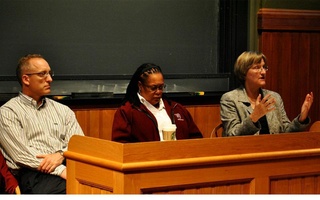As the Faculty of Arts and Sciences prepares its budget for the upcoming fiscal year, the administration will turn its attention to area-study centers to streamline spending of FAS resources, sparking concern among some center leaders.
In a meeting on Friday, directors of FAS centers—such as the Center for Middle Eastern Studies and the Weatherhead Center for International Affairs—met with FAS Dean Michael D. Smith to review FAS budgeting policy implemented last spring, at the height of the University’s fiscal woes.
The policy—termed the “first-dollar principle”—identifies areas across FAS that constitute core expenses and focuses on allocating resources in accordance with the established priorities.
But FAS leaders have yet to delineate the details of its “core priorities,” and the lack of clarity has left some center adminstrators wondering whether placing decision-making power in the hands of the top rung of FAS will undermine their own stake in the budgetary planning process.
In interviews with The Crimson yesterday, several FAS center adminstrators said that the policy may enable top adminstrative leadership in FAS to tailor centers’ funds to fit FAS priorities, which might not necessarily align with those of the centers.
“There is a lot of negotiating taking place,” said Government Professor and Interim Director of the Weatherhead Center James A. Robinson, who declined to comment on the specifics of Friday’s meeting.
Robinson added that the issue may be broached at today’s Faculty meeting, though such an item is currently not listed on the pre-distributed agenda.
The meeting with center adminstrators marked the first of a series of discussions between center administrators and FAS to take place over the semester.
Geology Professor Daniel P. Schrag, the director of the Center for the Environment—which is funded by the Office of the Provost rather than the FAS
administration—said he supports FAS administrators’ goals.
“The director should have an obligation to be responsive to the priorities of the dean,” Schrag said.
Director of the Center for American Political Studies Daniel Carpenter said that the first-dollar principle aligned with his own center’s commitment to student research.
Unlike other centers that focus on faculty research and visiting scholar programs, CAPS prioritizes its funding for undergraduate and graduate fellowships, Carpenter said.
The new policy will push centers to “not just be a faculty bastion, a little enclave away from the university,” he added.
But Carpenter also noted that the first-dollar principle was a newly-developed policy, subject to changes. “How’s it going to be when the rubber hits the road?” he said.
Read more in News
Councillor Withdraws State Senate CandidacyRecommended Articles
-
Student Community Center Foundation Plans For New CenterOrganizers of the proposed Student Community Center, which would house space for student gatherings at the Democracy Center at 45 Mount Auburn Street, met in Boylston Hall last night to present their plans on the center’s construction, design, and finances.
-
The Centralization of FASBut even as Smith successfully trims a daunting budget deficit, his approach has struck a nervous chord among faculty members who benefit from the incongruent academic and spending methods of the school. Led by affiliates of some of the traditionally independent FAS centers, they have voiced concerns that an overarching financial mission could intrude into their own academic priorities.
-
Harvard College Women’s Center Holds ConferenceThe Harvard College Women’s Center held its inaugural New England Women’s Center Conference this past weekend, during which participants discussed how to most effectively run a collegiate women’s center.
-
 Many Questions, Few Answers from Administrators at UC Meeting
Many Questions, Few Answers from Administrators at UC Meeting -
Regional Centers Suffer Cuts in FAS Financial AssistanceAs several of Harvard’s regional centers continue to cope with a 50 percent reduction in federal support, they must also suffer sustained cuts in financial assistance from the Faculty of Arts and Sciences.
-
Axing AusterityAxing and austerity, buzzwords-du-jour in the corporate, political, and academic worlds alike, have meant significant losses for the University’s regional centers.













